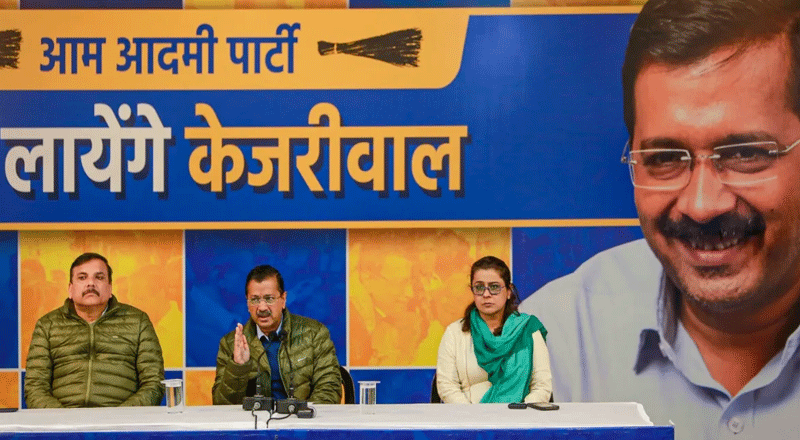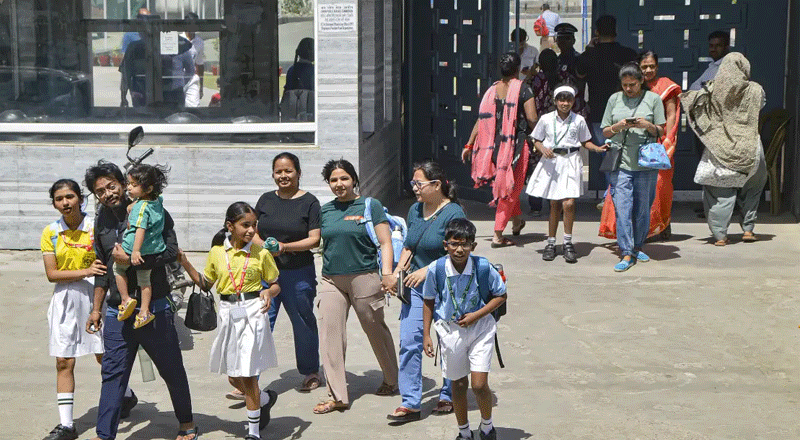The Vice President, Shri M. Venkaiah Naidu today appealed to schools across the nation to foster the spirit of curiosity, innovation and excellence in students to prepare them for the challenges of the 21st century, technology-driven world.
Calling for a futuristic approach to education while shunning rote education, Shri Naidu said “the best skill schools can impart to students today is that of adaptability”. “Train students to think quickly on their feet, to be agile and to innovate using cutting-edge technologies”, he added.
The Vice President was inaugurating the Vellore International School, an initiative of VIT Group of Institutions, near Chennai. Stressing the importance of schooling during the formative years of a child, Shri Naidu expressed concern that students were spending most of the time in the four walls of the classroom under the conventional education system. He called for encouraging the students to “experience the world outside – spend time in the lap of nature, interact with all sections of society, and understand various crafts and
Shri Naidu wanted classroom learning to be supplemented with field activities, social awareness and community service initiatives and added that there is a dire need to inculcate the spirit of service and patriotism in students from a young age.
The Vice President recalled that India’s ancient Gurukul system focused on the holistic development of an individual with the teacher spending time with the child. The stress was on character moulding and the correct assessment of the pupil. Observing that schools must borrow the positive aspects of ‘guru shishya parampara’, Shri Naidu also called for doing away with the artificial segregation between curricular and extracurricular activities and encouraging multidisciplinarity in education.
The Vice President wanted schools to focus on imparting a value-based, holistic education that brings out “the greatest potential and the highest virtues from each student”. He reminded that “education without values is no education at all”.
Underlining the importance of the mother tongue as the medium of instruction in schools, Shri Naidu said that “we must encourage students to speak freely in their mother tongue in their social environment. Only when we can freely and proudly speak in our mother tongue can we truly appreciate our cultural heritage.”
He also pointed out that proficiency in other languages, in addition to one’s mother tongue, helps build cultural bridges and opens windows to new worlds of experience. Emphasising that there should be “no imposition of and no opposition to any language”, the Vice President suggested that one must learn as many languages as possible but primacy must be given to mother tongue.
Shri Naidu also appealed to schools to encourage students to take up regular physical activity to ensure all-around growth of children. He advised students to enthusiastically take up sports or any form of exercise to build a healthy lifestyle.
Shri T. M. Anbarasan, Minister of MSME, Govt. of Tamil Nadu, Dr. G. Viswanathan, Founder & Chancellor, VIT Group of Institutions, Shri G.V. Selvam, Chairman, VIS & Vice-President, VIT, Shri Sankar Viswanathan, Vice President, VIT, Dr. Sekar Viswanathan, Vice President, VIT and others were present during the event.
Following is the full text of speech –
“I am very happy to be here in Chennai to inaugurate the Vellore International School. From what I can see, the school is shaping up to be a splendid and serene campus, ideal for learning, and I compliment the management of VIT Group of Institutions for this important milestone in their educational journey.
I am reminded of the renowned Tamil poet, Bharathiyaar, who wrote that it is more virtuous to educate a child than to build a thousand temples (aalayam) or set up thousands of feeding centres (anna chathiram). The VIT Group has been making consistent efforts to strengthen higher education in the private sector and I am confident this institution will be another feather in their cap.
Sisters and brothers,
As you are aware, India has been the treasure house of knowledge and the cradle of academic excellence since ancient times. In the Gurukul system, education was given utmost importance and the focus was on imparting knowledge and skills to bring out a holistic development of an individual. In fact, India was once known as Vishwaguru because of its world class international centres of learning like Takshashila, Pushpagiri and Nalanda. Thousands of students, including many from foreign countries, used to study diverse disciplines at these centres. Since ancient times, India made numerous contributions to the world of science, mathematics, philosophy, medicine, astronomy, among other disciplines.
Sisters and brothers,
It is my fervent appeal to the schools across the nation to foster the spirit of curiosity, innovation and excellence in students. In the technology-driven fast changing world, challenges and opportunities abound. In this context, the best skill schools can impart a student today is that of adaptability. Students must be trained to think quickly on their feet, be agile and innovate using cutting-edge technologies to solve 21st century problems.
We must have an educational strategy aligned to this futuristic approach and shun rote learning. We must also do away with the artificial segregation between curricular and extracurricular activities and encourage multidisciplinarity in education.
In the old Gurukul system, the teacher spent time and stayed with the student, allowing for the character moulding and correct assessment of the pupil. At Vellore International School, I am happy to be informed that they are trying to introduce a concept of ‘house parent’ to integrate the positive aspects of Guru Shishya parampara with modern pedagogical practices.
Sisters and brothers,
Another aspect that we must pay attention to is the use of mother tongue in school education. Wherever possible, at least until the primary level, we must have the medium of instruction in public and private schools in the mother tongue.
We must encourage students to speak freely in their mother tongue in their social environment – in the school premises, in all the cultural events and at their homes. Only when we can freely and proudly speak our mother tongue can we truly appreciate our cultural heritage.
I must reiterate here that focusing on our mother tongue is not to suggest that one need not learn other languages like English. In fact, I often say that one should learn as many languages as possible but what is required is a strong foundation in the mother language. Studies have shown that multilingualism can lead to better cognitive development in children. Proficiency in other languages, in addition to one’s mother tongue, helps build cultural bridges and opens windows to new worlds of experience.
Sisters and brothers,
It is indeed true that schooling lays the most important foundation for a student’s academic and professional excellence in later years. But more importantly, the time a child spends in school during his/her formative years shapes their personality and moulds their character. This becomes the biggest determinant in not only the individual’s success at a personal level – but is also key to build model citizenry that can take the country forward.
Schools must focus on value-based, holistic education that brings out the greatest potential and the highest virtues from each student. Remember, education without values is no education at all.
In the effort for an all-round growth of students, academic institutions must strive to provide the required facilities and encourage students to take up regular physical activity. Students must enthusiastically take up sports or any form of exercise which appeals to them and build a healthy lifestyle.
It is the bane of modern, competitive education that students are often constrained to the four-walls of the classroom in the name of academics. They must experience the world outside – spend time in the lap of nature, interact with all sections of society, and understand various crafts and trades. Classroom programmes must be ably supplemented with active participation in field activities, social awareness and community service initiatives. There is a dire need to inculcate the spirit of service in students from a young age.
Once again, I am very happy to have inaugurated this school today. My best wishes to Dr. Viswanathan, Shri. Selvam, management and the staff of the school as well as the VIT Group as they undertake this very important mission of nurturing and nourishing the young minds.





